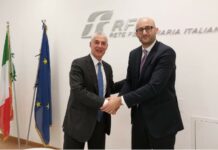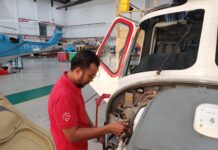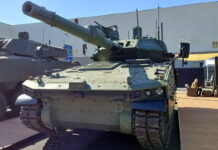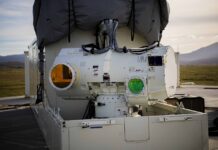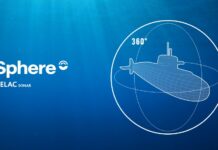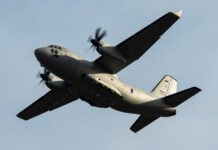The leading defence electronics suppliers for Japan, Italy and the United Kingdom announced the signing of a collaboration agreement at the DSEI Japan defence exhibition in Tokyo on 15 March 2023 focused on future work in relation to the trilateral Global Combat Air Programme (GCAP).
Japan’s Mitsubishi Electric, Leonardo UK, and Italy’s Leonardo and Elettronica have signed the agreement as “the next formal step towards a permanent industrial construct”, according to a Leonardo press release, which added that the companies “have agreed to forge a closer business relationship and assess appropriate commercial and international operating models, readying the partners for the next stage of the GCAP programme”.
As the defence electronics champions for each of the three GCAP nations, the companies will be responsible for the advanced electronics on board the GCAP platform that cover its Integrated Sensing and Non-Kinetic Effects & Integrated Communications Systems (ISANKE & ICS) domain.
GCAP was formed in December 2022 with the merger of the UK-led Future Combat Air Systems/Tempest future-generation fighter project, in which Italy was a partner, with Japan’s effort to develop a sixth-generation fighter under its F-X programme.

The companies have already conducted work relevant to GCAP: Mitsubishi Electric has been involved in advanced electronics development work for the F-X programme; Leonardo and Elettronica have been involved in maturing cutting-edge, future combat multi-domain technologies covering sensors, communications and data/information fusion as part of the Italian Defence Technology Initiative; and Leonardo UK is a founding member of the UK’s Tempest project, which was originally formed in 2018.
As described by Leonardo, “ISANKE will unlock the potential of sixth-generation tactical sensing. It transitions from the traditional combat air model of individual airborne sensors to instead providing a fully integrated sensing, fusion and self-protection capability that draws on a spider’s web of sensing and effecting nodes across each platform. ICS will allow ISANKE to operate as a network across formations of crewed and uncrewed aircraft, as part of each nations’ wider, multi-domain system of systems. ISANKE & ICS will also ensure that the three GCAP nations can interoperate with allies in joint operations.”
A key capability to be embedded into the GCAP core platform will be its ability to handle and interpret large amounts of data. This, Leonardo explained, will be vital in “providing aircrew with the information superiority they will need to succeed in complex and contested battlespaces, as well as contributing valuable intelligence to other operators”.
Recognising that they will need a new way of collaborating in order to deliver the GCAP programme – especially regarding its 2035 in-service target – Mitsubishi Electric, Leonardo/Leonardo UK and Elettronica have sought to enshrine this within their accord.
“The new agreement includes joint recognition of fundamental principles of working which will unlock this pace, while meeting customer requirements for a spirit of equal partnership by the three nations and creating an approach that meets each nation’s ambitions in terms of integrated mission support, freedom of action and freedom of modification,” stated Leonardo. “As the parties work towards a permanent commercial construct to deliver the domain, national requirements for industrial capabilities and principles of shared intellectual property will be considered in the spirit of a fully integrated tri-national programme.”
Peter Felstead




